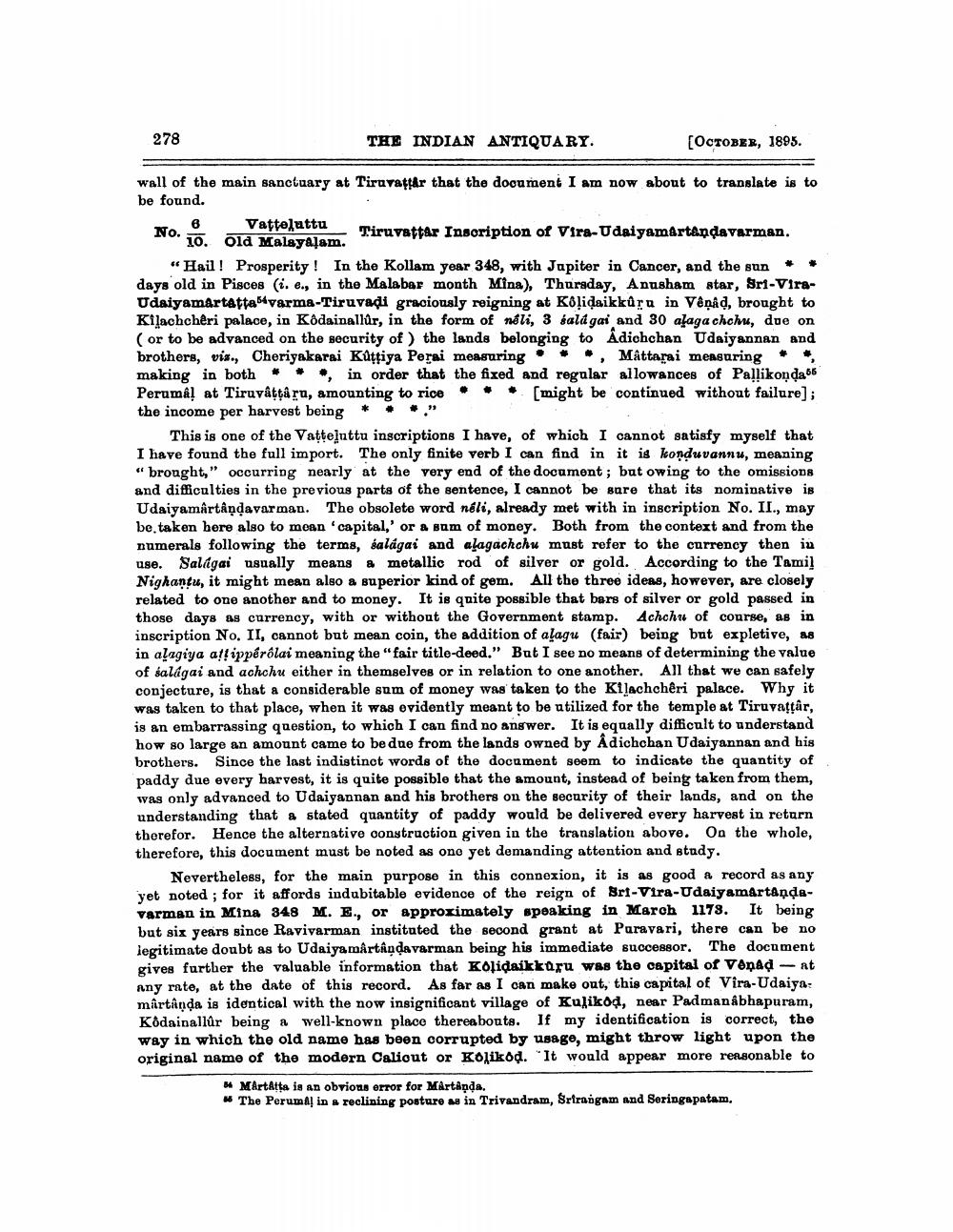________________
278
THE INDIAN ANTIQUARY.
[OCTOBER, 1895.
wall of the main sanctuary at Tiruvattar that the document I am now about to translate is to be found.
No.
6
Vatteluttu 10. Old Malayalam.
Tiruvattar Inscription of Vira-Udaiyamartandavarman.
"Hail! Prosperity! In the Kollam year 348, with Jupiter in Cancer, and the sun days old in Pisces (i. e., in the Malabar month Mina), Thursday, Anusham star, Sri-ViraUdaiyamartatta varma-Tiruvadi graciously reigning at Kôliḍaikkûru in Vênâd, brought to Kilachcheri palace, in Kôdainallur, in the form of néli, 3 saldgai and 30 alaga chchu, due on (or to be advanced on the security of) the lands belonging to Adichchan Udaiyannan and brothers, viz., Cheriyakarai Kûttiya Perai measuring , Mâttarai measuring making in both ***, in order that the fixed and regular allowances of Pallikonda Perumal at Tiruvâṭṭâru, amounting to rice ❤ [might be continued without failure]; the income per harvest being
This is one of the Vatteluttu inscriptions I have, of which I cannot satisfy myself that I have found the full import. The only finite verb I can find in it is konduvannu, meaning "brought," occurring nearly at the very end of the document; but owing to the omissions and difficulties in the previous parts of the sentence, I cannot be sure that its nominative is Udaiyamârtânḍavarman. The obsolete word néli, already met with in inscription No. II., may be taken here also to mean 'capital,' or a sum of money. Both from the context and from the numerals following the terms, salágai and alagachchu must refer to the currency then in use. Salagai usually means a metallic rod of silver or gold. According to the Tamil Nighantu, it might mean also a superior kind of gem. All the three ideas, however, are closely related to one another and to money. It is quite possible that bars of silver or gold passed in those days as currency, with or without the Government stamp. Achchu of course, as in inscription No. II, cannot but mean coin, the addition of alagu (fair) being but expletive, as in alagiya aflippêrôlai meaning the "fair title-deed." But I see no means of determining the value of salágai and achchu either in themselves or in relation to one another. All that we can safely conjecture, is that a considerable sum of money was taken to the Kilachchêri palace. Why it was taken to that place, when it was evidently meant to be utilized for the temple at Tiruvatțâr, is an embarrassing question, to which I can find no answer. It is equally difficult to understand how so large an amount came to be due from the lands owned by Âdichchan Udaiyannan and his brothers. Since the last indistinct words of the document seem to indicate the quantity of paddy due every harvest, it is quite possible that the amount, instead of being taken from them, was only advanced to Udaiyannan and his brothers on the security of their lands, and on the understanding that a stated quantity of paddy would be delivered every harvest in return therefor. Hence the alternative construction given in the translation above. On the whole, therefore, this document must be noted as one yet demanding attention and study.
Nevertheless, for the main purpose in this connexion, it is as good a record as any yet noted; for it affords indubitable evidence of the reign of Bri-Vira-Udaiyamartaṇḍavarman in Mina 348 M. E., or approximately speaking in March 1178. It being but six years since Ravivarman instituted the second grant at Paravari, there can be no legitimate doubt as to Udaiyamârtâṇḍavarman being his immediate successor. The document gives further the valuable information that Koliḍaikkuru was the capital of Venad - at any rate, at the date of this record. As far as I can make out, this capital of Vira-Udaiyamartanda is identical with the now insignificant village of Kulikod, near Padmanabhapuram, Kôdainallûr being a well-known place thereabouts. If my identification is correct, the way in which the old name has been corrupted by usage, might throw light upon the original name of the modern Calicut or Kolikod. It would appear more reasonable to
Martaṭta is an obvious error for Martaṇḍa.
The Perumal in a reclining posture as in Trivandram, Srirangam and Seringapatam.




